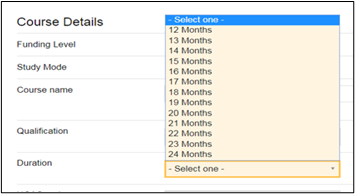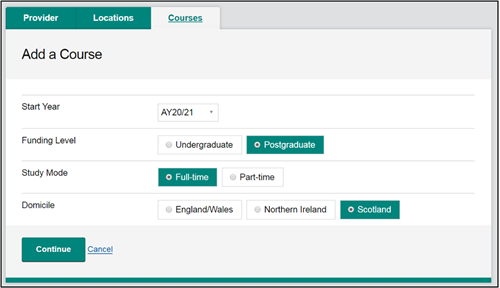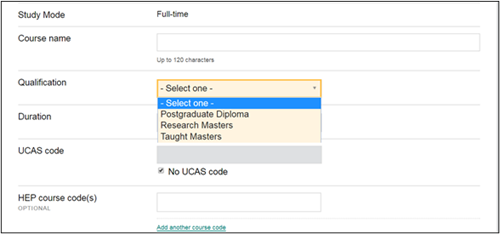Version 1.0 - Last Updated: 08 Jul 2025
Creating courses
Creating a postgraduate master’s course
This chapter will tell you how to create a postgraduate master's course.
It covers everything you need to know before you start adding these courses to CMS, including:
- eligibility
- academic year and course duration
- term dates and holidays
- available course years
It also explains how to handle specific courses:
- English postgraduate healthcare courses
- Scottish postgraduate courses
- architecture courses
The regulations for course eligibility differ between domiciles. You may need to set up separate courses for English and Welsh students depending on course duration and study mode.
Eligibility
Postgraduate Master’s Loans for English and Welsh students are only available for full 180 credit postgraduate master’s courses. These can be either taught or research-based and in any subject area.
The course must lead to a master’s qualification. The most common are:
- MSc (Master of Science)
- MA (Master of Arts)
- MPhil (Master of Philosophy)
- MRes (Master of Research)
- LLM (Master of Law)
- MLitt (Master of Letters)
- MFA (Master of Fine Arts)
- MEd (Master of Education)
- MBA (Master of Business Administration)
There are many different types of master’s degree, but they all must meet the outcomes the Quality Assurance Agency for Higher Education (QAA) has set out.
These are set out in 'The framework for higher education qualifications in England, Wales and Northern Ireland (FHEQ), 2018' and 'The framework for qualifications of higher education institutions in Scotland 2001'.
When you set up a postgraduate master’s course, the Qualification dropdown will give you the following options:
- taught master’s
- research master’s
- Master of Architecture (postgraduate Student Finance England and Student Finance Wales courses)
- Postgraduate Certificate (postgraduate Northern Irish courses only)
- Postgraduate Diploma (postgraduate Scottish and Northern Irish courses)
The following course types are ineligible for a Postgraduate Master’s Loan:
- undergraduate-funded courses
- postgraduate initial teacher training (ITT) courses
- Scottish Master of Arts (MA)
- Master of Architecture (where parts 1 and 2 are completed as a single course)
- English postgraduate healthcare courses
- integrated master’s courses which will continue to receive undergraduate funding
- doctoral courses (PhDs)
- other postgraduate-level courses (such as PGCert and PGDip) for English and Welsh students
Intercalated courses
Some undergraduate courses have an intercalating year where the students undertake a master’s degree. In this case, the students will be eligible for postgraduate loans in the intercalating year.
However, this will make them ineligible for any further undergraduate funding.
Academic years
The regulations define the academic year as a 12-month period beginning on either 1 September, 1 January, 1 April or 1 July. The date depends on when the course started.
|
Date course started |
Academic year |
|
Between 1 August and 31 December |
1 September to 31 August |
|
Between 1 January and 31 March |
1 January to 31 December |
|
Between 1 April and 30 June |
1 April to 31 March |
|
Between 1 July and 31 July |
1 July to 30 June |
We will not make payments to students beyond the end of the academic year. If a student's course starts on 12 October 2020 and ends on 8 October 2021, we'll pay any funding in the academic year the course starts in. For this example, we'll complete payments by 31 August.
Full-time course duration
Full-time postgraduate master’s courses for England and Wales can have a total duration of 1 or 2 years.
When you create a full-time postgraduate master's course for England and Wales, you can select the number of months (12 to 24) from the Duration dropdown.

Once you've selected the duration and saved the course, both the year and month durations will show. This is because some other systems are still using the year value.

For Northern Irish students, the course duration can be between 1 and 3 years. It is the same for part-time postgraduate courses.
You can find more information on postgraduate courses for Scottish students in the Scottish postgraduate courses chapter.
Part time English course duration
You can set up a part-time postgraduate master’s course with a duration of 1 or 2 years full-time equivalent.
You can also set it up with 2 or 3 years fixed duration if there's no full-time equivalent course.
You must only use the '2 years full-time equivalent' option if you offer a 2-year full-time version of the course.
The courses can be studied as follows:
- part-time courses with a duration of 1 year full-time equivalent – will be studied over 2 years
- part-time courses with a duration of 2 years full-time equivalent – will be studied over 3 or 4 years
- part-time courses with a duration of 2 years no full-time equivalent – will be studied over 2 years
- part-time courses with a duration of 3 years no full-time equivalent – will be studied over 3 years
If you're offering part-time versions of your full-time courses, students must be able to complete the part-time version in no more than twice the time it takes to complete the full-time equivalent. Otherwise, it cannot be a designated course.
For example, if a you offer a 1-year full-time course part-time over 3 years, the 3-year part-time version cannot be designated. You must not add non-designated courses to CMS.
You can find more information about designated courses in the SFE PG Masters Guidance chapter on the SFE practitioners website.
Part-time Welsh course duration
As of academic year 2018/19, you can set up part-time postgraduate master’s courses for Welsh-domiciled students with a duration of 2, 3 or 4 years.
If a course has a full-time equivalent, you should enter the duration as the duration of study in academic years, and not the full-time equivalent duration. For example, if a one-year full-time equivalent course is studied over 2 years, you should enter the course with a 2-year duration:
- enter part-time Welsh courses studied over 2 years as 2 years no full time equivalent
- enter part-time Welsh courses studied over 3 years as 3 years no full time equivalent
- enter part-time Welsh courses studied over 4 years as 4 years no full time equivalent
Since 2018/19 you have the option to select a 4-year duration for Welsh students.
Validation
CMS shows all duration options, but you cannot save a course with a 1 or 2 year full-time equivalent duration designated for Wales.
You will get an error message that you cannot save a course with this duration and Welsh designation.
Likewise, you cannot save a course with 4 years no full-time equivalent duration designated for England.
Term dates
If you offer postgraduate master’s courses, you must enter 3 sets of term dates for all course years. This is so students receive their funding payments throughout the period of their study.
The term dates you enter determine the students' payment dates. If you do not have terms, we still need 3 terms in our system. This is because we pay students at 3 points throughout the academic year. You should create term dates that reflect the study pattern of your students. For example, you could use any holiday periods as a natural term break.
You should include exam periods in your term dates. However, do not include periods when students are waiting for their results or resitting exams.
If the final course year is shorter than the rest of the course years, your term dates should reflect that. For example, if the course duration is 15 months, the second year would be 3 months long. The last year of study still needs 3 terms regardless of the length. In this example, the 3 term dates for year 2 could be each of the 3 remaining months.
You can find further examples in the Term date scenarios section under this chapter.
If you enter a term start or end date that's on a weekend, the system will ask you to confirm this is correct before it lets you save the course.
Term date scenarios
Scenario 1
For a 3-year part-time course, the term dates may look like this:
Year 1
Term 1: 27 August to 21 December
Term 2: 14 January to 19 April
Term 3: 7 May to 20 July
Year 2
Term 1: 27 August to 21 December
Term 2: 14 January to 19 April
Term 3: 7 May to 20 July
Year 3
Term 1: 27 August to 21 December
Term 2: 14 January to 19 April
Term 3: 7 May to 20 July
Scenario 2
For an 18-month full-time course, the term dates may look like this:
Year 1
Term 1: 27 August to 21 December
Term 2: 14 January to 19 April
Term 3: 7 May to 20 July
Year 2
Term 1: 27 August to 25 October
Term 2: 28 October to 21 December
Term 3: 13 January to 21 February
Adding intakes
When you create a new course and enter term dates for all years, there is an option to add another intake.
If the course you're creating has a September start, you can enter another intake that starts later in the academic year, for example in January.
You cannot add an intake once you have saved a course, so you should add all intakes before you save.
You can create up to 12 intakes under a postgraduate master’s course – only one per month.
If you need to, you can amend the first intake month when you save the course in the new academic year. For example, if your course had a September intake in the previous academic year, you can change this to October in the new academic year.
Available course years
You can apply Available course years to all full-time and part-time postgraduate courses for English, Welsh and Northern Irish students. It cannot be applied to postgraduate courses for Scottish students. The 2 settings are:
- all students
- no students
When a course is no longer needed for new students, you should set your courses to No students instead of closing them. This makes sure continuing students still receive their funding. You can transfer students on or off the courses if you need to.
Scottish postgraduate courses
From academic year 2020/21 you can add postgraduate courses for Scottish students as postgraduate rather than undergraduate courses.
You can do this in the same way you would add your other postgraduate courses.
- Select Add a Course.
- Choose the correct Study mode. Only Scottish providers can select part-time.
- Select Postgraduate funding level.
- Select Scotland from the domicile options.

- Select Continue. You can then enter the remaining course details.
The Qualifications dropdown menu will have 3 options:
- Postgraduate Diploma
- Research Master’s
- Taught Master’s

Once you select the qualification, the relevant duration options will become available:
- postgraduate diploma: 1 year full-time and 2 or 3 years part-time
- master’s (research and taught): 1 or 2 years full-time and 2, 3 or 4 years part-time
For the course fee, you should enter the full amount. If your course is more than one year in duration, split your fees equally across all years of the course.
You should complete all other fields as normal.
Northern Irish postgraduate courses
You can add postgraduate courses for Northern Irish students the same way you would add your other postgraduate courses.
From academic year 2024/25, eligible universities and colleges based in the Republic of Ireland can add postgraduate courses for Northern Irish students. You can find eligibility guidance for postgraduate courses for NI students on the Student Finance NI website.
- Select Add a Course.
- Select Postgraduate Funding Level.
- Choose the correct Study Mode.
- Select Northern Ireland from the Domicile options.

- Select Continue. You can then enter the remaining course details.
The Qualifications dropdown will have 4 options:
- Postgraduate Certificate
- Postgraduate Diploma
- Research Master’s
- Taught Master’s
Once you select the qualification, the relevant duration options will become available.
You should complete all other fields as normal.
Universities and colleges based in the Republic of Ireland
Universities and colleges based in the Republic of Ireland must only enter a maximum fee amount of £6,500. If the course duration is longer than one year, and the overall course fee amount is more than or equal to £6,500, you must enter £6,500 for each year of the course. This is to make sure that students can apply for the correct funding.
You must convert the course fee from euros into pounds when you enter it on CMS.
For academic year 2025/26
You must convert euros to pounds using the exchange rate of 0.848 (1 euro = 0.848 pounds).
For example, you'd enter a course fee of €7000 as £5936 (7000 x 0.848 = 5936).
For academic year 2026/27
You must convert euros to pounds using the exchange rate of 0.8535 (1 euro = 0.8535 pounds).
For example, you'd enter a course fee of €6000 as £5124 (6000 x 0.8535 = 5121).